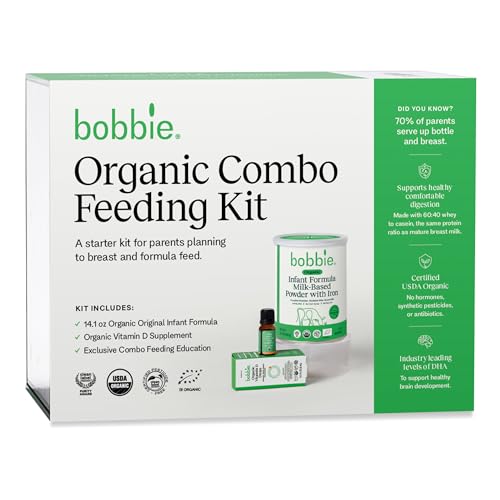As I prepared to feed my baby boy, my mind naturally turned to the ongoing debate of breastfeeding versus formula feeding. It’s like standing at a crossroads, unsure of which path to take.
The benefits and drawbacks of each option can be overwhelming, leaving us wondering which choice is best for our little one. But before we make a decision, let's explore the intricate layers of this topic and unravel the complexities that come with nourishing our babies.
Key Takeaways
- Breastfeeding offers unmatched health benefits for both baby and mother.
- Formula feeding provides convenience and flexibility for caregivers.
- Breastfeeding promotes bonding and emotional connection between mother and baby.
- Choosing between breastfeeding and formula feeding requires considering individual needs and health benefits.

Momcozy Original Nursing Pillow for Breastfeeding-Pioneering Safety Fence- Wider Feeding Pillows for More Support for Mom & Baby- Easier Nursing & Hand Free- Fit for All, Removable Cotton Cover
Easy Deep Latch for Baby, Stress-Free Nursing for Mom:Momcozy nursing pillow provides great support for mom and baby…
As an affiliate, we earn on qualifying purchases.
As an affiliate, we earn on qualifying purchases.
Benefits of Breastfeeding Vs. Formula Feeding
When comparing the benefits of breastfeeding to formula feeding, it becomes evident that breast milk offers unique advantages that contribute significantly to the health and development of infants. Breast milk contains antibodies that boost the baby's immune system, reducing the risk of illnesses. This protective aspect is lacking in formula feeding, potentially leading to more health issues for the baby. Additionally, breast milk is easily digested, which may reduce constipation and gas in babies compared to formula-fed infants.
Additionally, breastfeeding has been linked to improved cognitive function in babies when compared to formula feeding. The nutrients and bioactive components present in breast milk play a crucial role in the baby's brain development. Furthermore, breastfeeding not only benefits the baby in the short term but also lowers the risk of various diseases in later years for both the baby and the mother. This long-term protection against illnesses makes breast milk a vital factor in promoting overall health and well-being.

INTTERO Baby Bottles with Built-in Formula Dispenser, Anti-Colic Wide Neck Design for Newborn Feeding and Everyday Baby Essentials, 9 Oz Medium Flow (2 Pack), Stylish White
𝗘𝗮𝘀𝘆 𝗙𝗼𝗿𝗺𝘂𝗹𝗮 𝗣𝗿𝗲𝗽𝗮𝗿𝗮𝘁𝗶𝗼𝗻 – Built-in baby formula container to go lets you mix bottles instantly with one hand…
As an affiliate, we earn on qualifying purchases.
As an affiliate, we earn on qualifying purchases.
Health Benefits of Breastfeeding

Breastfeeding offers a multitude of health benefits for infants, providing essential nutrients and antibodies that greatly enhance their immune system. Breastfed babies have a lower risk of allergies, eczema, ear infections, and stomach issues. Research has shown a decrease in hospitalization rates for respiratory illnesses in breastfed infants. Moreover, breastfeeding reduces the chances of obesity, diabetes, and sudden infant death syndrome (SIDS).
Both the American Academy of Pediatrics and the World Health Organization recommend breastfeeding for maximum health benefits. The antibodies present in breast milk help protect babies from infections and diseases, creating a strong foundation for their immune systems. Breastfeeding also promotes a healthy weight in infants, lowering the risk of obesity and related conditions later in life. By providing essential nutrients and antibodies, breastfeeding plays an essential role in safeguarding the overall health and well-being of babies.

Organic Combo Feeding Kit, Baby Formula, Milk Based Powder with Iron, DHA and Vitamin D & 100% Lactose (14.1 oz), Organic Baby Vitamin D Drops 400 IU (0.3 fl oz) Newborn Baby-12 Months Old
ORGANIC BABY FORMULA AND VITAMIN D DROPS: Introducing the go-to kit for parents who are both breastfeeding and…
As an affiliate, we earn on qualifying purchases.
As an affiliate, we earn on qualifying purchases.
Convenience of Formula Feeding
Formula feeding offers a convenient alternative for caregivers and parents seeking a hassle-free feeding option for their infants. When considering the convenience of formula feeding, several factors come into play:
- Easy Preparation: Formula feeding allows for quick and straightforward preparation, making it ideal for busy caregivers juggling multiple responsibilities.
- Ready-to-Feed Formulas: Ready-to-feed formulas eliminate the need for refrigeration or warming, providing instant feeding solutions that can be a time-saver in hectic situations.
- Flexibility in Feeding Schedules: Formula feeding offers flexibility in feeding schedules, enabling parents to coordinate feeding times with work or other commitments more easily.
The convenience of formula feeding can be particularly beneficial for families with multiple caregivers or situations where simplicity and speed are essential. Ultimately, the ease of preparation and quick feeding solutions that formula feeding provides can offer practical benefits for caregivers looking for a straightforward feeding option.

Tommee Tippee Advanced Anti-Colic 12 Piece Set, 5 oz and 9 oz BPA Free Bottles, Newborn 0+ Months, Includes Slow & Medium-Flow Breast-Like Nipples and Bottle Handles and Cleaning Brush
Innovative Anti-Colic Technology: Tommee Tippee Advanced Anti-Colic bottles are made with our patented vented wand that keeps air…
As an affiliate, we earn on qualifying purchases.
As an affiliate, we earn on qualifying purchases.
Challenges of Breastfeeding
Discussing the shift from highlighting the convenience of formula feeding to exploring the obstacles of breastfeeding, it is important to acknowledge that breastfeeding can present various challenges for mothers and infants. Some common breastfeeding hurdles include nipple soreness, engorgement, and mastitis, which can cause discomfort and even infection. Additionally, issues like low milk supply, latching difficulties, and painful nursing positions can impede successful breastfeeding.
| Breastfeeding Challenges | Description | Tips for Overcoming |
|---|---|---|
| Nipple Soreness | Common in early stages | Proper latch technique |
| Engorgement | Breasts feeling full and tender | Frequent nursing sessions |
| Mastitis | Inflammation of breast tissue | Antibiotics if necessary |
| Low Milk Supply | Inadequate milk production | Consult a lactation consultant |
Breastfeeding can also be emotionally challenging, especially for mothers experiencing postpartum issues. Some may face hurdles like thrush, clogged ducts, or difficulties with milk let-down. Seeking support from lactation consultants, support groups, and healthcare providers can help overcome these breastfeeding challenges.
Considerations for Choosing Feeding Method
When considering the best feeding method for your infant, it's important to weigh the benefits and challenges of each option carefully.
- Nutritional Benefits: Breastfeeding provides essential nutrients and antibodies that formula feeding may not replicate. It offers tailored nutrition that adjusts to the baby's changing needs, promoting peak health and development.
- Convenience and Flexibility: Formula feeding offers convenience and flexibility for caregivers who may not be able to breastfeed. It allows for easier scheduling of feedings and may be necessary for certain medical conditions.
- Bonding and Emotional Connection: Breastfeeding promotes bonding through skin-to-skin contact and the release of oxytocin, enhancing the emotional connection between the parent and the infant.
Making informed decisions about feeding methods involves considering the health benefits, risks, and individual needs of both the infant and the caregiver. Consulting with healthcare providers can help navigate the complexities of infant nutrition and make choices that prioritize the well-being of the child.
Frequently Asked Questions
Are Breastfed Babies Healthier Than Formula Fed?
We believe breastfed babies tend to be healthier than formula-fed babies. Breast milk's antibodies and nutrients boost immunity, reducing risks of infections and diseases. Research suggests breastfeeding fosters better cognitive development and long-term health benefits, supporting overall well-being.
Is It Better to Give Your Baby Breastmilk or Formula?
Is it better to give your baby breastmilk or formula? We believe it depends on individual needs. Breastfeeding provides unique benefits, while formula offers convenience. Both options can nourish and nurture your baby; choose what works best for you and your little one.
What Are the Downsides of Formula Feeding?
When considering formula feeding, it's important to acknowledge potential downsides like the absence of natural antibodies, increased risk of digestive issues, financial strain due to costs, and the possible lack of bonding experiences for both baby and mother.
What Are 5 Disadvantages of Breastfeeding?
Breastfeeding, though beneficial, can bring challenges. Sore nipples, public discomfort, and limited freedom are some downsides. Medical restrictions and demanding schedules may add to the strain. Despite its advantages, it's important to acknowledge these hurdles.
Conclusion
In the delicate dance of feeding our little ones, breastfeeding and formula feeding each have their own unique steps. Just as a mother's embrace provides warmth and nourishment, breast milk offers essential nutrients and boosts immunity.
Yet, like a well-tailored suit, formula feeding provides convenience and tailored nutrition. Whichever path we choose, we must trust our instincts and embrace the journey with love and understanding.









